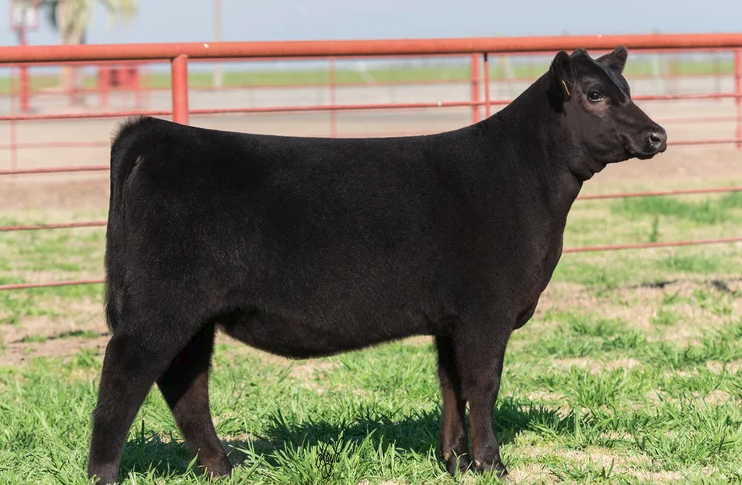About the Association:
The Florida Angus Association is a group of approximately 100 ranch family members who own, raise and/or show the Angus breed. Membership is made up primarily of Florida members although, we do have several family ranches from Georgia and Alabama. The goal of the Florida Angus Association is to promote the breed and encourage fellowship among Angus producers in the Southeast. Events throughout the year include board meetings, two field days and an annual meeting. The field days are usually held in the Spring and Fall and in conjunction with our strong junior program where we host a registered and open Angus show.
 About the Angus Breed:
About the Angus Breed:
The Advantage of Angus Genetics:
- Strong maternal traits
- Calving ease
- Growth
- Carcass quality
- Convenience
- Versatility
Maternal – Angus cows are known for their inherent mothering and calf-rearing abilities. They have superior milking capabilities and udder soundness, along with high fertility and a docile nature, making them ideal mothers.
Plus, the breed’s moderate size and fleshing ability allows Angus females to mature early, breed back quickly and have comparatively short gestation periods. These important traits help make Angus females invaluable to an industry that depends on reproductive performance.
![Copy of 167157_186169354741953_100000466681068_638333_986656_n[1]](https://floridaangusassociation.com/wp-content/uploads/2013/02/Copy-of-167157_186169354741953_100000466681068_638333_986656_n1-300x199.jpg)
Calving Ease – The Angus breed and the Association’s genetic tools offer producers viable approaches to address calving difficulty, which can result in increased mortality, increased calving intervals, lower conception rates, reduced weaning weights and economic losses. Angus contribute lower birth weights, which can be used to introduce calving ease into a herd and reduce the incidence of dystocia.
Growth – Angus offer the desired combination of calving ease and growth. The breed complements its low birth weight genetics with vigorous growth from birth to harvest.
Carcass Merit – The ability of Angus to produce a quality carcass even in the most challenging environments and fulfill producer and consumer preferences, has secured the breed’s position as the unequaled beef quality leader.
The breed’s inherent marbling ability allows Angus to produce high quality meat. In addition, the breed’s tendencies to put on flesh evenly, along with curve-bending growth rates, have also contributed to desirable, uniform beef products.
Combined, these traits help provide the great tasting beef consumers desire, which, in turn, increases the value of Angus genetics.
Other convenience traits – Angus offer a combination of traits that can help save producer stime and money. Angus are low-maintenance, adaptable, and undemanding, and their docile nature provides unmatched convenience.
Angus cattle are naturally polled, allowing producers to use Angus bulls to genetically dehorn without the increased morbidity and impaired performance associated with traditional dehorning.
Also, the breed’s dark-pigmented skin absorbs sunlight and helps prevent cancer eye, a common condition affecting other breeds. In the same way, Angus cattle are able to avoid sunburned or snow- burned udders common to light-skinned breeds in certain parts of the country.
Versatility – Angus cattle provide balanced genetics, and the Association offers convenient services, and management and marketing programs that make Angus a good fit whether using a crossbreeding or straight- breeding system.
Straightbreeding – A straightbred Angus program provides a simplified management approach compared to the more intensive management requirements of a crossbreeding program. Properly selected straightbred Angus cows can provide ample milk and calving ease, while steers earn top prices and achieve consistent, high performance in the feedlot and on the rail. Producers can apply selection pressure to produce excellent replacement heifers for their own herds or to earn growing premiums paid for Angus feeder calves or replacement females.
Crossbreeding – Depending on environment and available resources, many producers utilize crossbreeding in their herds to provide heterosis, or hybrid vigor. With a carefully planned breeding program, heterosis can provide enhanced performance in lowly-heritable traits, such as calf survival, beyond the average of the parental breeds that originated the cross.
However, implementing an effective crossbreeding system requires careful planning. Overuse of breeds with too much mature size or birth weight can lead to future problems and unwanted ex-
Angus-sired calves add value to any operation, with marketing advantages available through the AngusSource® program and Certified Angus Beef LLC (CAB). – Read More –